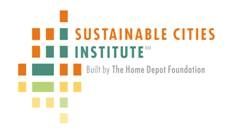Two Cities Selected for $1 Million Investment to Implement "Sticks and Bricks" Initiatives

ATLANTA, November 10, 2010 – The Home Depot® Foundation’s Sustainable Cities Institute (SCI) announced today the pilot cities selected to participate in its new city program – Charleston, South Carolina and Fayetteville, Arkansas. The cities will participate in a three-year, $1 million initiative to demonstrate the challenges and successes of implementing lasting sustainability programs at the local level. Their results – both the successes and the challenges – will be shared on a weekly basis at www.sustainablecitiesinstitute.org/city_program.

The winning cities initiatives are “sticks and bricks" projects and related policies that will produce tangible, long-lasting results. Each project is designed to provide immediate cost savings for these cities and their residents and also to be easily replicable in other communities.
“The term ‘sustainability plan’ often leads to skepticism or indifference because people don’t know what it means for them. We want to demonstrate through these pilot cities that real efficiencies and budget savings can be achieved by proactive planning in areas like energy use, waste and recycling, and building maintenance,” said Kelly Caffarelli, president, The Home Depot Foundation. “Charleston and Fayetteville presented impressive initiatives to save local resources and reduce costs while providing great benefits to local residents. We’re excited at the opportunity to work with them to implement those plans and to share the common successes and pitfalls with cities everywhere.”
The Sustainable Cities Institute will support each pilot city with $500,000 in funding from The Home Depot Foundation plus a full-time local coordinator. In addition, SCI will provide ongoing technical assistance from sustainability experts, such as the Urban Land Institute and the Center for Neighborhood Technology. At the end of the three year program, specific and measurable sustainability goals will have been achieved through the following initiatives:
City of Charleston in partnership with The Sustainability Institute of South Carolina:
- Achieve significant utility savings by conducting energy assessments and retrofits on 200 single-family residential homes within the City of Charleston, including historic, low- to moderate-income households, and affordable housing units.
- Provide substantial and verifiable data on the current condition of Charleston’s residential building stocks, best practices for energy efficiency retrofits, and savings potential.
- Create a specialized curriculum to teach energy efficient renovations for historic structures in hot humid climates; and enhance the City’s Green Collar Workforce and energy efficiency services industry through industry growth and job opportunities.
- Provide data needed to reduce the environmental impact of Charleston’s built environment, as well as arm Charleston’s building industry with the skilled labor force and resources it needs to integrate energy efficiency as a standard of building practices.
“This generous grant from The Home Depot Foundation will help our low-to moderate-income residents save money and will enable all of us to reap the benefits of a sustainability program at the local level,” said Charleston, South Carolina Mayor Joseph P. Riley, Jr. “Reaching higher energy efficiency will help those residents most adversely impacted by rising energy costs. Additionally, this grant will enable us to create a workforce trained in this new industry. Our goal is to be a model program in the implementation of sustainability.”
City of Fayetteville in partnership with the National Center for Appropriate Technology:
- Build approximately 40 ENERGY STAR-certified homes for low- to-moderate-income families in the Walker Park neighborhood, which will advance goals for healthy, affordable housing, improve access to alternative transportation corridors and increase economic opportunity in the area.
- Design and build the new neighborhood to meet LEED for Neighborhood Development Standards, ensuring the principles of smart growth and energy efficient design are included. For instance, due to the existing urban forest on the site, the neighborhood will serve as a model design for maximized tree canopy conservation and urban cooling eco-services. A community garden is also included in the site design.
- Develop a Low Impact Development (LID) Drainage and Engineering Specifications Manual to provide technical guidance for developers as the city works to reduce non-point source pollution through storm water run-off into its 100 miles of streams, which drain into local drinking water reservoirs. This manual will be field tested immediately in the Walker Park neighborhood. This manual will serve as a national model for how to implement LID specifications into mainstream site design standards. In addition, a teaching/ demonstration area will be implemented in the Walker Park neighborhood development.
- Extend a section of the Northwest Arkansas Regional Multi-Trail system to the Walker Park neighborhood, providing residents with inexpensive transportation options and opportunities to further reduce overall vehicle traffic in Fayetteville.
“We look forward to collaborating with The Home Depot Foundation to help working families in our community by providing healthy, affordable housing and low-cost transportation; demonstrating how smart growth can benefit a community economically and environmentally; and providing a national model that can be used successfully in other communities as well,” said Fayetteville, Arkansas Mayor Lioneld Jordan.
Charleston and Fayetteville were chosen through a competitive selection process, including a site visit and extensive review by SCI partners, including experts from Southface and the Center for Neighborhood Technology.
About the Sustainable Cities Institute
Built by The Home Depot Foundation in 2009, the Sustainable Cities Institute is working with cities across the country as a resource to assist in the planning and implementation of local sustainability strategies. Through its web site, SCI provides vetted best practices, downloadable guides, communication tools and interactive forums to ensure that cities have easy access to everything they need to quickly move forward with sustainability planning and implementation in a budget-friendly way. Learn more at www.sustainablecitiesinstitute.org.
Created in 2002, The Home Depot Foundation supports nonprofit organizations dedicated to creating and preserving healthy, affordable homes as the cornerstone of sustainable communities. The Foundation’s goal is for all families to have the opportunity to live in healthy, efficient homes they can afford over the long-term; to have access to safe, vibrant parks and greenspaces; and to receive the economic, social and environmental benefits of living in a sustainable community. Since its formation, The Home Depot Foundation has granted $190 million to nonprofit organizations and supported the development of more than 95,000 homes, planted more than 1.2 million trees, and built or refurbished more than 1,875 playgrounds, parks and greenspaces. For more information, visit www.homedepotfoundation.org, follow us on Twitter @homedepotfdn and like us on Facebook at www.facebook.com/homedepotfoundation
This press release is presented without editing for your information only.























